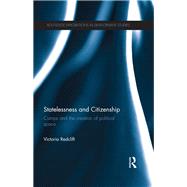- ISBN: 9780415631358 | 0415631351
- Cover: Hardcover
- Copyright: 7/23/2013
What does it mean to be a citizen? The book challenges current views of citizenship by focussing on displacement and experiences of space as a political concept. The crude binary oppositions of statelessness and citizenship are no longer relevant. In-depth field research with a stateless population in Bangladesh revealed that, despite liberal theory's reductive vision, the boundaries between statelessness and citizenship are fluid and contingent. The Urdu-speaking population in Bangladesh exemplify some of the key problems facing uprooted populations. Using Bangladesh as a case study, therefore, the book argues that access to and understandings of, citizenship are temporally, socially and spatially produced. Set in a site of camp and non-camp based displacement the analysis establishes a framework for apprehending and appreciating the lived spaces of statelessness across the world. Unpicking Agamben's distinction between 'political beings' and 'bare life', the book considers experiences of citizenship through the camp as a social form. The camps of Bangladesh do not function as bounded physical or conceptual spaces in which denationalized groups are altogether divorced from the polity. Instead 'acts of citizenship' occur at the level of everyday life, as the moments in which formal status is transgressed. Until now the space of citizenship has failed to recognise the non-citizens who can, through complicated accommodations and creative alliances, occupy or negotiate that space. Using these insights, the book develops the concept of 'political space', an analysis of the way historical processes shape spatial arrangements, informing the identities and political subjectivity available to people. In doing so, it provides an analytic approach of relevance to wider problems of displacement, citizenship and ethnic relations.






